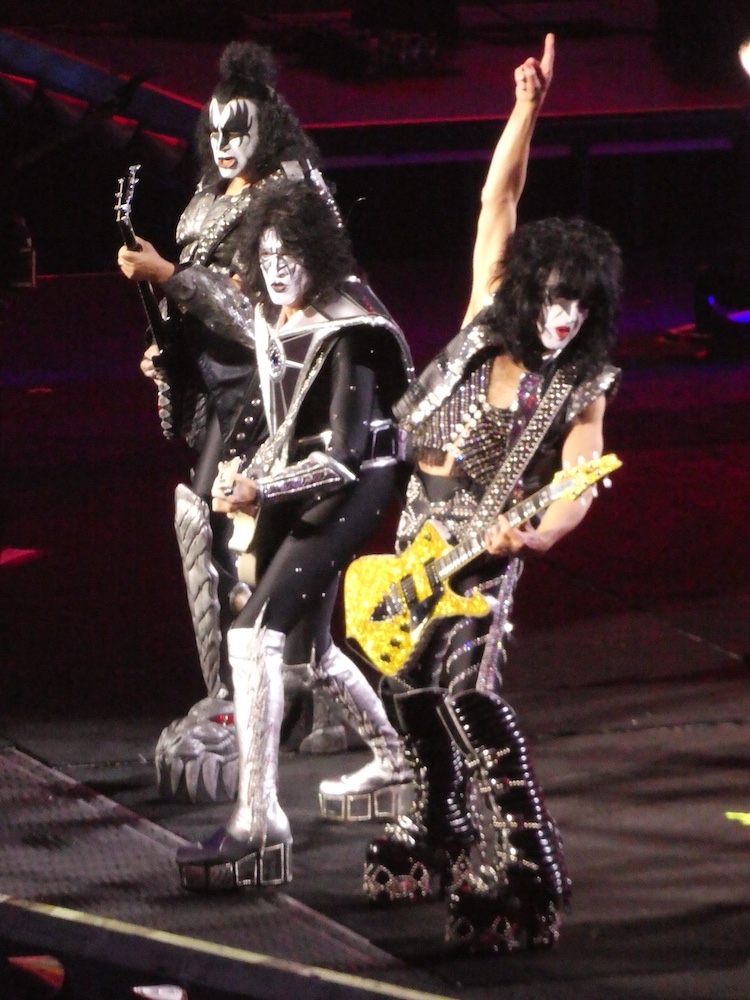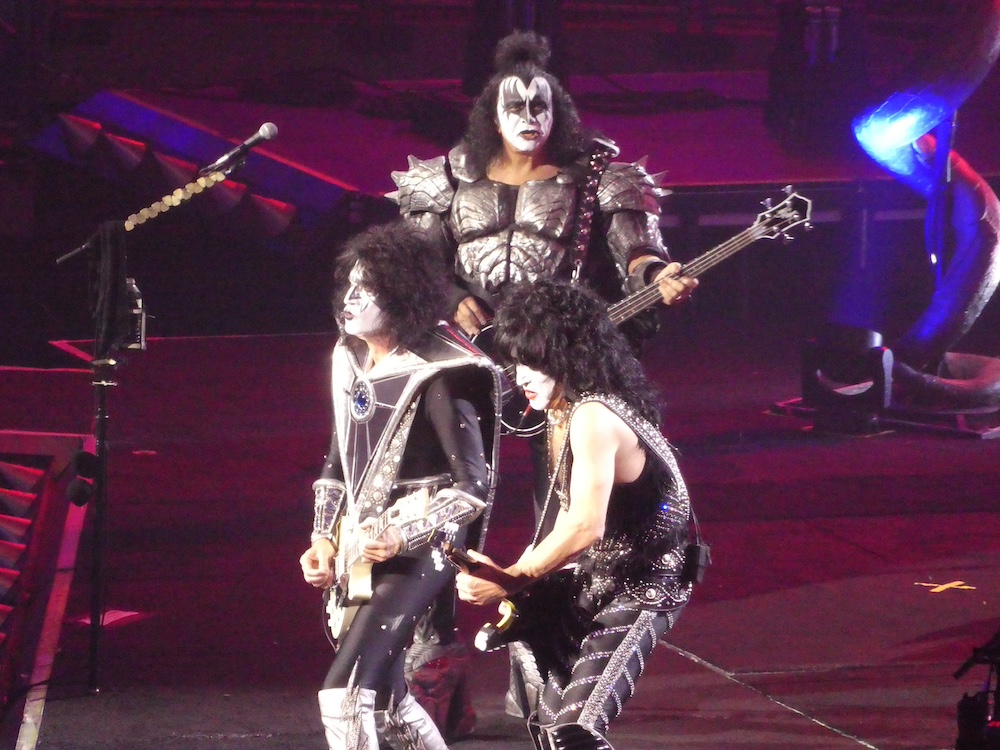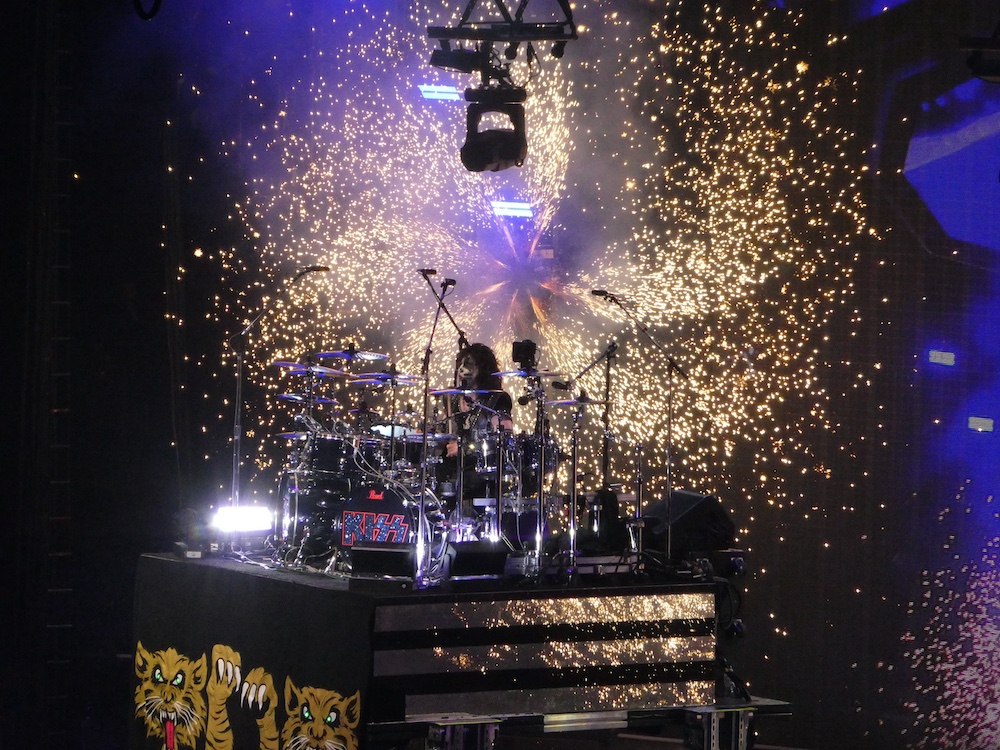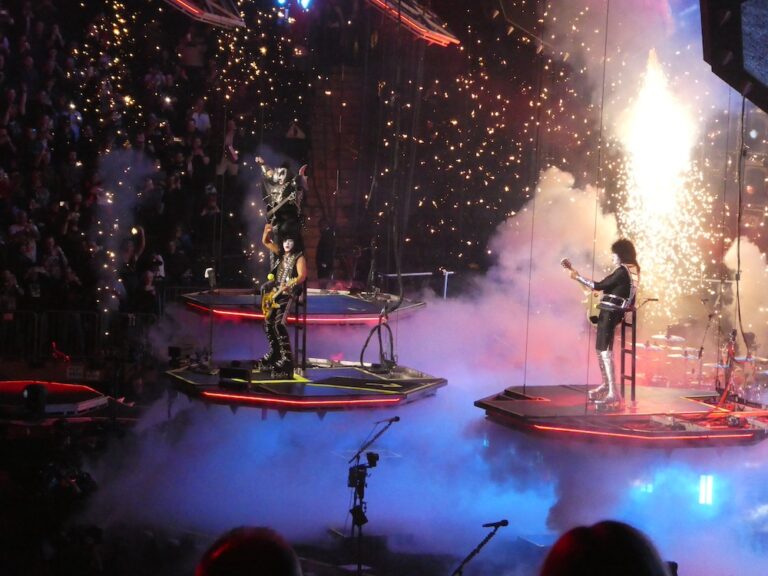For decades, perhaps as far back as the 1970s, as each Kiss tour was announced, the Kiss Army speculated on whether or not this was the band’s final tour. After all, the group’s popularity had peaked in the mid-1970s and numerous marketing strategies, including solo albums, a film, and an unmasking were created to generate a revival of interest. Kiss’ first official retirement tour was in 2000. The band then quickly un-retired. Finally, the band promised to unpack its suitcases for the last time with the End of the Road tour that started in January 2019 and ended at Madison Square Garden on December 2, 2023. That is Kisstory’s touring legacy in a nutshell.
Kiss’ road finale ended with a week of high-profile activities in New York City, where the band was born. Mayor Eric Adams declared an official Kiss Day, the Empire State Building was emblazoned with a Kiss light show during the night hours, Inked NYC offered complimentary KISS tattoos, the New York Rangers hosted a Kiss night, a Kiss pop-up store sold merchandise for four days, and a website offered fans the opportunity to see their names in the lettering of the Kiss logo. All of this fanfare was in advance of Kiss’ final two concerts at Madison Square Garden, about 10 blocks north of where the band first rehearsed 50 years ago.
Marketing was more blatant than at your typical concert. Madison Square Garden sold Kiss merchandise all day long to accommodate Kiss fans without concert tickets. Upon entering the lobby of the arena for the concert, fans lined to take a photograph with a life-size poster of a Kiss member. (Noted was the QR code at the top of the poster, where a phone camera could open yet another opportunity to buy Kiss merchandise.) After a set by the support band, Amber Wild, which featured Paul Stanley’s son, Evan, video screens during the lengthy intermission repeatedly showed the QR code. The marketing continued even after the concerts. Want to see the show again from home? A pay-per-view costs $39.99.
The live performance was the main event, for sure. As the Kiss curtain disappeared, Kiss descended onto the stage from mid-air risers and roared into “Detroit Rock City.” The band continued with familiar catalog: “Shout It Out Loud” and “Deuce.” Kiss repeated the 23-song setlist that the band had been playing throughout the tour. For the most part, the set was comprised of melodic hard rock anthems, with the exception of “Beth,” on which Eric Singer sang and played a grand piano. The band was not breaking new ground tonight; instead, it was mining its 1970s peak period.

The set had several musical high points. During “Lick it Up,” Kiss ventured into a snippet of the Who’s “Won’t Get Fooled Again.” Stanley and Thayer ended “Makin’ Love” with a guitar duel. Throughout the concert, Thayer fueled the songs with impressive guitar leads, while Simmons, Stanley, and Singer kept the rhythms rocking.
While the music remained strong throughout the performance, the concert also aimed to be the greatest rock spectacle of all time. Music-synced LED light bracelets were available to fans at every seat. Bassist Gene Simmons spit blood and blew flames. Lead guitarist Tommy Thayer played a guitar that shot fireworks. Guitarist Paul Stanley told the audience that he wanted to be out in the audience with them, then as “Love Gun” began, he left his band mates on the main stage and zip-lined across the arena to a smaller stage, where he remained through “I Was Made for Lovin’ You,” then zip-lined back to the main stage after starting “Black Diamond.” All four musicians, including drummer Eric Singer, positioned themselves on hydraulic platforms that rose and lowered. Simmons and Thayer rode on cherry-picker cranes that traversed over the center of the arena. Stanley smashed his guitar into the stage and ruptured the fretboard at the end of the concert. Towers of flames, confetti, and streamer cannons, as well as giant Kiss balloons, were tossed into the audience; hardly a moment passed when “spectacle” was not the operative word. More than 100 kabuki-makeup-wearing and costumed fans in the audience joined in the spectacle.
Stanley attempted to channel the fans’ sadness over the end of Kiss’ live concerts into a celebration of the band’s half-century with references to Kiss’ journey. Stanley reminisced driving a taxi in New York City in 1972 and taking passengers to see Elvis Presley at Madison Square Garden, telling them that someday people would be coming there to see him and his band. At Kiss’ first show at the arena in 1977, he recalled being thrilled at seeing his parents on one side of the venue and Simmons’ mom on the other.
Despite the historic importance of the final performances, original members guitarist Ace Frehley and drummer Peter Criss did not make appearances.
And so came the end of the road for Kiss. The musicians that professed in 1975 while in their twenties that they wanted to rock and roll all night and party every day are now – a half century later – in their seventies and retiring their platform boots. If indeed this was the band’s last live show ever, the rock legends went out with more than a bang. Yet, although this weekend was supposed to be the end of the road for Kiss, it is not the end of Kiss. Kiss announced that the band’s legacy will live on as avatars. What was not mentioned was that the band will live on as merchandisers, as well.

Setlist
- Detroit Rock City
- Shout It Out Loud
- Deuce
- War Machine
- Heaven’s on Fire
- I Love It Loud
- Say Yeah
- Cold Gin
- Guitar Solo
- Lick It Up (with the Who’s “Won’t Get Fooled Again” bridge)
- Calling Dr. Love
- Makin’ Love
- Psycho Circus (partial)
- Drum Solo
- 100,000 Years (partial)
- Bass Solo
- God of Thunder
- Love Gun
- I Was Made for Lovin’ You
- Black Diamond
Encore
- Beth
- Do You Love Me
- Rock and Roll All Nite




